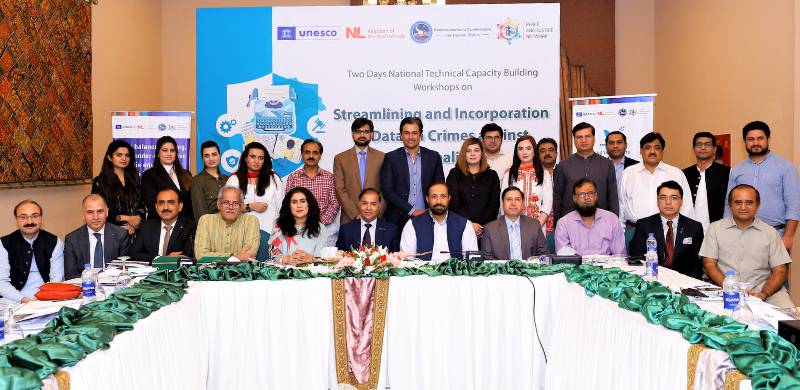
Press Release
Peace & Justice Network (PJN), Parliamentarians Commission of Human Rights (PCHR) and UNESCO have organized a two day training workshop in Islamabad for the purposes of efficient data collection on crimes against journalists.
To further strengthen the institutionalization of the reporting on crime against journalists by improving national data collection mechanisms, and to enhance government’s ability to meet its international reporting obligations, such as on SDG Voluntary National Reporting VNR at next UN HLPF, UENSCO Members State response, UPR and other international obligations, on issues related to the safety of journalists, Peace & Justice Network (PJN) and Parliamentarians Commission of Human Rights (PCHR) in collaboration with UNESCO organized a two days national technical capacity building training workshop on streamlining and incorporating data on crime against journalists in Pakistan on 27th and 28th April 2022 in Islamabad.
This workshop was organized with government protection institutions, human rights and SDGs reporting departments, law enforcement and crime reporting agencies and human right commissions.
Executive Director Parliamentarians Commission Shafique Chaudhry in his opening remarks emphasized the importance of freedom of expression and press freedom in light of the Constitution of Pakistan. He said that press freedom is directly linked to and is dependent on the safety of the journalist.
Freedom of expression is the touchstone of all other human rights and reinforces the achievement of all of the Sustainable Development Goals. Freedom of expression and free flow of information are foundations of public debate and democracy which leads to ensuring balanced, strong, and gender-responsive media environment in Pakistan. There will be no sustainable development without strengthening the rule of law, and providing access to information for all citizens.
Chief Executive Peace & Justice Network Syed Raza Ali Naqvi also presented a thought provoking presentation on the importance of significant data of crime against Journalists and how that data should be collected and maintained by the State and all other stakeholders so that informed policy debate can be generated and improved institutional response can be ensured.
He further shared the highlights and milestones achieved since the launch of program back in 2019 including first national report on crime against journalists produced in 2021 by National Police Bureau, after the development of reporting framework at federal and provincial police departments, passage of journalist rights protection law passed in 2021 by National Assembly and Sindh Assembly.
He also talked about its key features, current data collection process on SDG 16.10.1 crime against journalist for SDGs Voluntarily National Review (VNR) at UN High-Level Political Forum and launch of national initiative to for establishing coordination mechanism between relevant ministries and establish focal points for gathering of data from federal and provincial police departments as well as its use of reporting and monitoring tools to enhance accountability.
Peace & Justice Network (PJN), Parliamentarians Commission of Human Rights (PCHR) and UNESCO have organized a two day training workshop in Islamabad for the purposes of efficient data collection on crimes against journalists.
To further strengthen the institutionalization of the reporting on crime against journalists by improving national data collection mechanisms, and to enhance government’s ability to meet its international reporting obligations, such as on SDG Voluntary National Reporting VNR at next UN HLPF, UENSCO Members State response, UPR and other international obligations, on issues related to the safety of journalists, Peace & Justice Network (PJN) and Parliamentarians Commission of Human Rights (PCHR) in collaboration with UNESCO organized a two days national technical capacity building training workshop on streamlining and incorporating data on crime against journalists in Pakistan on 27th and 28th April 2022 in Islamabad.
This workshop was organized with government protection institutions, human rights and SDGs reporting departments, law enforcement and crime reporting agencies and human right commissions.
Executive Director Parliamentarians Commission Shafique Chaudhry in his opening remarks emphasized the importance of freedom of expression and press freedom in light of the Constitution of Pakistan. He said that press freedom is directly linked to and is dependent on the safety of the journalist.
Freedom of expression is the touchstone of all other human rights and reinforces the achievement of all of the Sustainable Development Goals. Freedom of expression and free flow of information are foundations of public debate and democracy which leads to ensuring balanced, strong, and gender-responsive media environment in Pakistan. There will be no sustainable development without strengthening the rule of law, and providing access to information for all citizens.
Chief Executive Peace & Justice Network Syed Raza Ali Naqvi also presented a thought provoking presentation on the importance of significant data of crime against Journalists and how that data should be collected and maintained by the State and all other stakeholders so that informed policy debate can be generated and improved institutional response can be ensured.
He further shared the highlights and milestones achieved since the launch of program back in 2019 including first national report on crime against journalists produced in 2021 by National Police Bureau, after the development of reporting framework at federal and provincial police departments, passage of journalist rights protection law passed in 2021 by National Assembly and Sindh Assembly.
He also talked about its key features, current data collection process on SDG 16.10.1 crime against journalist for SDGs Voluntarily National Review (VNR) at UN High-Level Political Forum and launch of national initiative to for establishing coordination mechanism between relevant ministries and establish focal points for gathering of data from federal and provincial police departments as well as its use of reporting and monitoring tools to enhance accountability.

